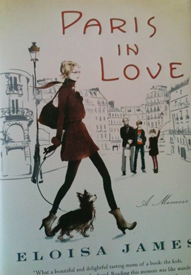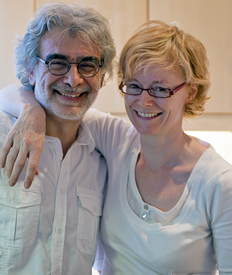Alessandro Vettori's spouse Mary Bly, a noted romance novelist, has published a memoir about their year in Paris, which came after a cancer diagnosis

Someone chooses an academic career to pursue a “life of the mind” – but that doesn’t mean that real life, with all of its worries and messiness, won’t occasionally intervene.
That’s the situation Alessandro Vettori, associate professor of Italian and Comparative Literature in Rutgers' School of Arts and Sciences, encountered a few years back when his young family confronted a crisis. In December 2007, his mother-in-law died of ovarian cancer; two months later his wife, Mary Bly, a professor of English Literature at Fordham, received a diagnosis of breast cancer.
Their response? Shake things up: Vettori requested and was granted a family leave from Rutgers, and Vettori, Bly, and their two children, Luca and Anna, 15 and 10 respectively, headed to Paris for a change of scene and a chance to regroup. For Vetorri it was a life-altering experience that transformed his approach to life, scholarship and family relationships. The year abroad is also the subject of his wife’s new memoir, Paris in Love (Random House), written under her pen name, Eloisa James.
Today is rainy, cool, and windy in Paris. The sky is silvery gray, like the watered silk skirts of a Victorian lady.
It is a sweet book; this quote shows the author’s light, allusive touch. And readers looking to immerse themselves in the culinary, aesthetic and sensory delights of Parisian life will find much to savor. But it is also a bittersweet book. For throughout, echoes of the fear and loss that prompted the trip appear, even as the family revels in their shared adventure.
“The two of us felt a need to back off,” says Vettori. “We’d been devoting our lives to research and teaching and service without stop since graduate school. This was a time to shake our heads and say, ‘does this really make sense?’ We basically took a sabbatical in the true, etymological sense of the word. It was a way to assess: where are we? What have we done as a family, a couple, as scholars? For all of us, including our two children, the year was a turning point.”
By creating a new, albeit temporary, life on untried turf, pressing the pause button on daily routines, Vettori and his family were able to rethink priorities, jettison assumptions about the meaning of success and enjoy the gifts of the moment. And, the true icing on the gateau, bring these lessons home with them.
Vettori’s epiphanies belie the deceptive freedoms of academic life. While actual classroom time may not seem arduous hour-wise, like many professors “I never really stop. I feel if I’m not doing research, I’m not doing anything. That goes for committee and administrative work as well as scholarship. What happened to us is that we felt the need to let go. That’s not the kind of thing you do in our field. But ironically, it deepened my work.”
Vettori’s primary academic interest is Dante. He is known for his popular undergraduate class Dante and Medieval Culture, which draws up to 150 students from a variety of disciplines. “It’s wonderful to introduce students to a masterpiece like The Divine Comedy,” he says. He’s long been interested in the theme of “the journey” in Dante’s work – in part as a native of Italy who chose to make his life in the United States.

“Paradoxically I get more done,” he says. “Maybe in a day I don’t write two pages, but one paragraph. But maybe the paragraph is better. Maybe I’ve enjoyed the process more.”
For many years, Vettori’s author-spouse lived a double life: writing best-selling Regency romance novels as Eloisa James while, under her own name, lecturing on Shakespeare. She managed to keep the two separate until 2005.
“She came out of the closet after seven years of writing novels,” he recalls. She revealed her other work to the department at Fordham and, much to Vettori and Bly’s surprise, “They were thrilled. Some people sneer at romances. Now romances are studied by academics. Today Mary Bly co-directs Fordham’s creative writing department and she’s writing articles about the intersection of high-brow and genre literature. She’s changed the field.”
Nearly three years post-Paris, Bly, whose father is the poet and author Robert Bly and who grew up on a Minnesota farm, is cancer-free.